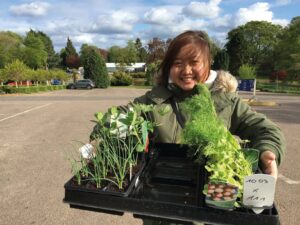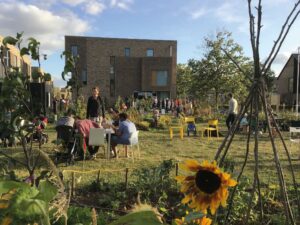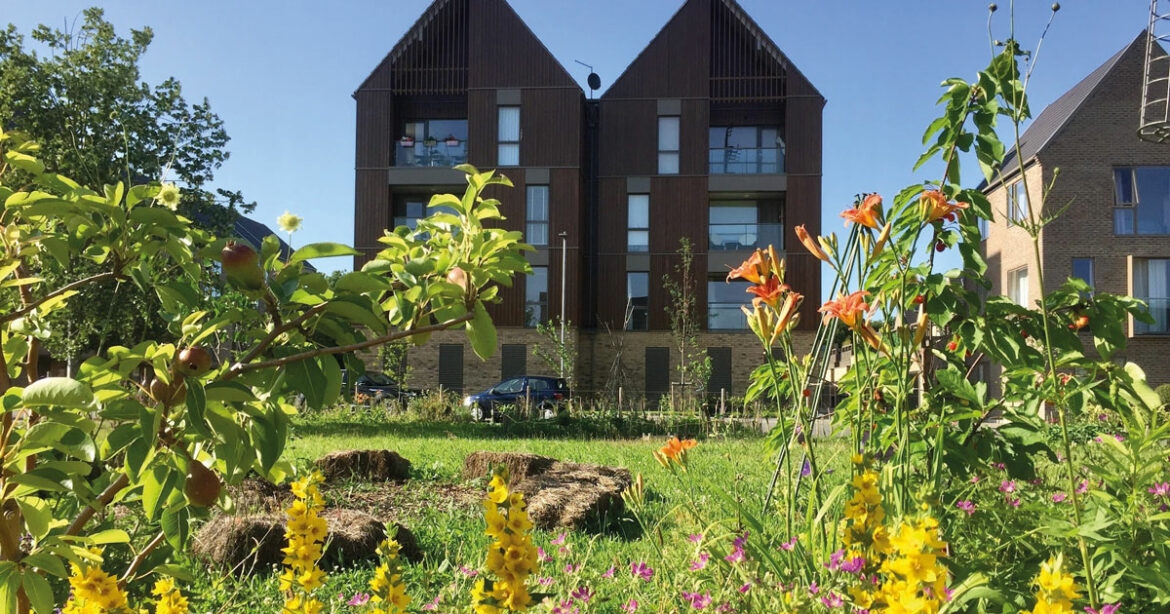Miriam Balanescu meets the city’s ardent allotments, from seasoned horticulturalists to green new growers
On the outskirts of the city, or tucked between buildings, Cambridgeshire hides a stunning crop of allotments. Not only do these sites allow locals to grow their own food, but they also nurture communities, bringing people together from all walks of life. During the pandemic, when we hankered after the open air, waiting list numbers soared, filling up Cambridge’s modest 26 sites.
For those who have not yet dipped their toes (or fingers), 12 of Cambridgeshire’s allotment sites are managed by the city council, while 14 are handled by local societies – bringing a mix of old-time gardening enthusiasts ready to relay their wisdom, and novices with new shoots of horticultural passion. Apart from the satisfaction of growing your own grub, allotments bring vital environmental benefits – locally sourced food reduces carbon emissions otherwise necessary for transportation.
The first week after Clay Farm’s much-delayed opening in May 2021, 40 of its plots were occupied. Li, founder of the Clay Farm Community Garden, was first involved in initiatives welcoming residents of the Great Kneighton development. Sharing facilities with the allotments, the community garden was cultivated on fields amid building sites. When lockdown hit, Li saw locals make a dash for space. “If you go now, it looks as if it’s been there for years. Every single plot is up and running.”
Allotments have been brimming since the pandemic, with members turning to social media to post pictures of their plunder when restrictions were tight, or hosting harvesting events when they were eased. Previously deserted or unkempt, many of Cambridgeshire’s allotments have been given a new lease of life. As we gradually return to some sort of normality, lockdown – a time when we craved the great outdoors – has sown the seeds for the next generation of gardeners.
Going green
For Roger, the creation of new allotments nearby during the first lockdown was the nudge he needed to get involved. “Having a reason to be outside and work in the fresh air was quite appealing. There’s lots of footpaths across the fields around us, so we’re able to walk in the countryside.”
 Although Roger already has a garden, the wider scope offered by an allotment finally made him green-fingered. “I wasn’t sure how well it was going to go. Having a dedicated plot meant if it didn’t work out the first year, it didn’t matter. That sounded great.” Gardening requires patience, he warns: his first year was spent readying the plot for use the following spring. But, with a sprinkling of luck, Roger has started to see sprouts of garlic, broad beans, parsnips and potatoes.
Although Roger already has a garden, the wider scope offered by an allotment finally made him green-fingered. “I wasn’t sure how well it was going to go. Having a dedicated plot meant if it didn’t work out the first year, it didn’t matter. That sounded great.” Gardening requires patience, he warns: his first year was spent readying the plot for use the following spring. But, with a sprinkling of luck, Roger has started to see sprouts of garlic, broad beans, parsnips and potatoes.
Other factors have contributed to this new-found biophilia across the UK. “I’m passionately involved in gardening for wellbeing,” Li says. “It is good for your mental and physical health. It’s a green gym – you don’t have to pay, just go and do some volunteer digging!”
While gardening was once considered the pursuit of older generations, vastly heightened climate awareness has inspired a budding breed of growers. “Gardening tends to be passed on generation to generation,” Helen, chair of the Nuffield Road Allotment Society, suggests. “Plenty of people on the allotment are doing what they did with their fathers. Now, they’re in their 70s.” During the pandemic, some experienced gardeners were under strain, while new numbers boomed, leading to a period of rapid change.
Though allotments require maintenance, nature must – to an extent – be allowed to run its course. Helen emphasises the importance of messiness: “What constitutes real nature isn’t necessarily manicured.” Strolling around the site nestled in East Chesterton, its glorious unruliness, creativity and diversity is striking – something, Helen says, that should be celebrated.
A garden of one’s own
Societies are the foundation of Cambridgeshire’s allotments, guiding its members towards the best soils and equipment, and offering advice on everything from efficient growing methods to diets. Some, such as the Rock Allotment Society, are hundreds of years old. After lockdown, Nuffield Road restored its community garden (formerly removed in the 2000s), to provide extra support for new gardeners flocking to these horticultural hubs. Shared spaces can be a good alternative for those unable to devote themselves to their own patch, while they can reap many of the same rewards.
 Room of one’s own is still important: Becky, a chef, was among those without a garden during the pandemic. Her passion for all things green grew out of her love of food, manifesting in a balcony overrun with plants. Fortunately, she was offered an allotment on Trumpington Meadows before the first lockdown. “My workplace was closed, so I had a lot of hours. It was amazing to have a place to go. I love my husband, but time apart is important.
Room of one’s own is still important: Becky, a chef, was among those without a garden during the pandemic. Her passion for all things green grew out of her love of food, manifesting in a balcony overrun with plants. Fortunately, she was offered an allotment on Trumpington Meadows before the first lockdown. “My workplace was closed, so I had a lot of hours. It was amazing to have a place to go. I love my husband, but time apart is important.
“I’ve learned to take moments to myself and be happy with that, which I didn’t really do before my allotment,” Becky continues. “Whereas, now I can spend five hours weeding and let my mind relax. I’ve gained friends and just a sense of achievement.” The cook likes to be as experimental with growing as eating – with cucamelons, circle brussels sprouts, yellow raspberries, purple globe artichoke and heritage tomatoes waiting to sprout. She shares her culinary creations to the Trumpington Meadows Allotment Growers Facebook group.
One upshot of rocketing interest in allotments is that, increasingly, urban developers are including them in planned housing. Though, Helen fears this may be merely a box-ticking exercise. “We could be utilising a lot more spaces that are currently empty. If local people took initiative and felt ownership of those, that’s another form of allotmenting.”
Growing together
If managed well, allotments can introduce a breadth of opportunity for equality and education. Li began gardening to feed her family: “I couldn’t afford to buy organic fruit and vegetables, so I started growing my own. I became interested in promoting healthy eating and organic growing, especially for young families and those on low incomes.”
Gardening, though, is often an uphill struggle. Jess and her friend Aoife, an agronomist, made the @plot84a_cambridge Instagram in November 2020, to document their allotment journey from bare soil to bloom. “I’ve gained an appreciation for how much work goes into the production of food,” Jess says. “You work your arse off for an entire year and, at the end of it, you get around four radishes!”
Jess explains that one of the crowning glories of the Chesterton Allotments is its multiculturalism: she is from Ireland, while her neighbours hail from north Africa, Spain and Japan. Meanwhile, signing up at Foster Road helped Claire get back to her roots: “When growing up in China, my parents had a large backyard. We used to grow vegetables and had a huge plum tree.”
Growing comfort food made me feel closer to home
As lockdown arrived, Claire sought refuge on her plot. She returned to the ingredients of her childhood, which were difficult to buy in the UK. “Growing my comfort food made me feel closer to home.” Planting tamara runner beans, fennel, chillies and raspberries, she bonded with others over her crop. “One of my neighbours on the allotment is from South Africa. She got excited to see me growing Caribbean spinach because that’s what she grew up eating. It got us talking about being away from our home countries.”
With the urgency of the climate crisis, environmental education is more crucial than ever. Head to any allotment in Cambridgeshire and you may see children mucking in, getting to grips with nature. Li has witnessed changes to the natural world first-hand: “Over the 20 years I’ve been allotmenting, I saw the decline of certain species.” She emphasises the importance of “equality of opportunity for people to grow food, but also get to know nature”.
A fresh start
Caring for a plot brings responsibility for those of all ages. “Nature doesn’t wait for you,” Li notes. With thoughtful planning, you can ensure there is something to harvest throughout the seasons, keeping busy year-round. Chat to any allotment user and they will first warn you of the inevitability of eventual failure. But their excitement when it comes to seeing efforts bear fruit is uncontainable. With a wealth of well-versed gardeners in Cambridgeshire, don’t be afraid to ask for advice if you’re new to this – you won’t be able to resist getting your hands grubby.

